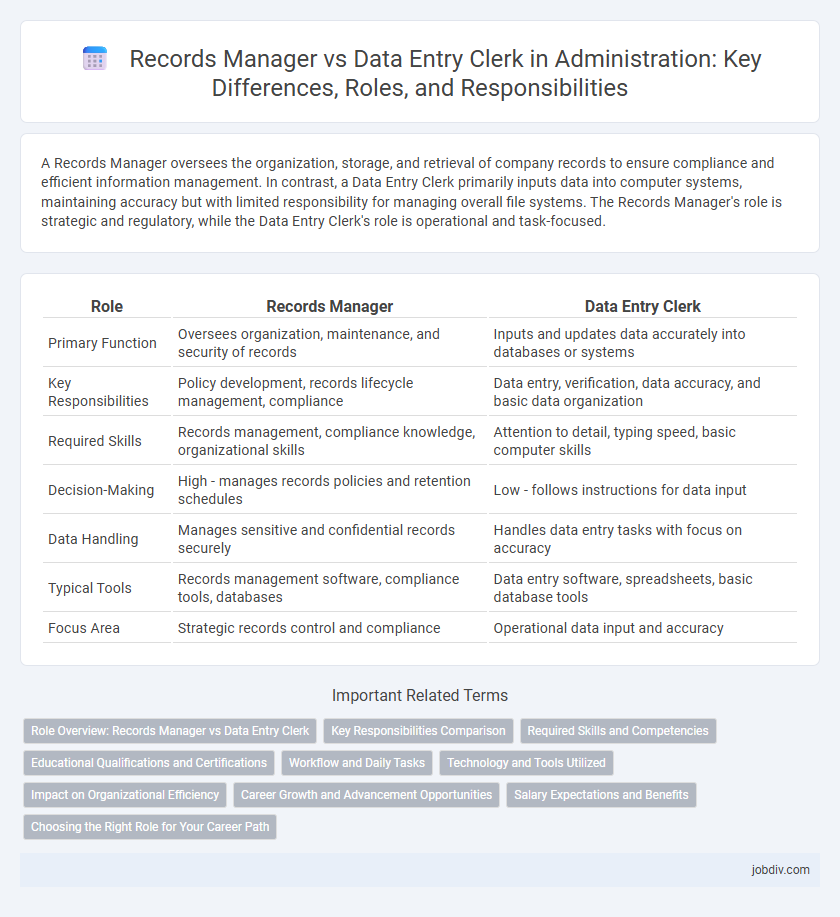A Records Manager oversees the organization, storage, and retrieval of company records to ensure compliance and efficient information management. In contrast, a Data Entry Clerk primarily inputs data into computer systems, maintaining accuracy but with limited responsibility for managing overall file systems. The Records Manager's role is strategic and regulatory, while the Data Entry Clerk's role is operational and task-focused.
Table of Comparison
| Role | Records Manager | Data Entry Clerk |
|---|---|---|
| Primary Function | Oversees organization, maintenance, and security of records | Inputs and updates data accurately into databases or systems |
| Key Responsibilities | Policy development, records lifecycle management, compliance | Data entry, verification, data accuracy, and basic data organization |
| Required Skills | Records management, compliance knowledge, organizational skills | Attention to detail, typing speed, basic computer skills |
| Decision-Making | High - manages records policies and retention schedules | Low - follows instructions for data input |
| Data Handling | Manages sensitive and confidential records securely | Handles data entry tasks with focus on accuracy |
| Typical Tools | Records management software, compliance tools, databases | Data entry software, spreadsheets, basic database tools |
| Focus Area | Strategic records control and compliance | Operational data input and accuracy |
Role Overview: Records Manager vs Data Entry Clerk
A Records Manager oversees the organization, maintenance, and security of company records, ensuring compliance with legal and regulatory requirements. A Data Entry Clerk focuses on accurately inputting, updating, and managing data within databases or information systems. While the Records Manager handles strategic information management, the Data Entry Clerk supports operational data accuracy and accessibility.
Key Responsibilities Comparison
Records Managers oversee the organization, maintenance, and secure archiving of company documents while ensuring compliance with legal and regulatory standards. Data Entry Clerks focus on accurately inputting, updating, and verifying data within electronic systems to support operational efficiency. Both roles are essential in managing information flow, but Records Managers prioritize document lifecycle management and policy enforcement, whereas Data Entry Clerks emphasize data accuracy and timely processing.
Required Skills and Competencies
A Records Manager requires expertise in information governance, compliance regulations, and advanced organizational skills to oversee systematic record-keeping processes and ensure data integrity. A Data Entry Clerk must possess high typing speed, accuracy, and proficiency in database software and data validation techniques to efficiently input and maintain records. Both roles demand attention to detail, but the Records Manager emphasizes strategic data handling and policy enforcement, while the Data Entry Clerk focuses on operational data accuracy and timely processing.
Educational Qualifications and Certifications
Records Managers typically hold a bachelor's degree in library science, information management, or business administration, often accompanied by certifications such as Certified Records Manager (CRM) or Information Governance Professional (IGP). Data Entry Clerks generally require a high school diploma or equivalent, with on-the-job training being the primary form of qualification, while certifications like Microsoft Office Specialist (MOS) or data management courses can enhance their skill set. Advanced certifications and formal education markedly distinguish Records Managers by equipping them to oversee information governance and compliance, unlike Data Entry Clerks whose focus is on accurate data input.
Workflow and Daily Tasks
Records Managers oversee the organization, maintenance, and secure storage of company records, ensuring compliance with regulatory standards and facilitating efficient information retrieval. Data Entry Clerks focus on accurately inputting, updating, and verifying data within databases or management systems, supporting operational workflows with timely and error-free information processing. Effective collaboration between these roles enhances overall administrative workflow by combining meticulous data handling with strategic records management.
Technology and Tools Utilized
Records Managers utilize advanced document management systems (DMS) such as SharePoint and Laserfiche to ensure secure storage, retrieval, and compliance tracking, while implementing metadata tagging and version control technologies. Data Entry Clerks primarily rely on data capture software and basic office productivity tools like Microsoft Excel and Google Sheets for accurate input and verification of information. Both roles increasingly incorporate automation tools like OCR (Optical Character Recognition) and AI-driven data validation to enhance efficiency and minimize errors.
Impact on Organizational Efficiency
A Records Manager enhances organizational efficiency by implementing systematic record-keeping strategies, ensuring data accuracy, security, and compliance with legal standards. In contrast, a Data Entry Clerk contributes by accurately inputting and updating information but plays a more operational role with limited influence on policy and workflow optimization. Effective collaboration between both roles streamlines information management, reduces errors, and supports timely decision-making.
Career Growth and Advancement Opportunities
A Records Manager typically experiences faster career growth due to responsibilities involving strategic information governance, compliance, and leadership roles, often advancing to senior management or information governance positions. In contrast, a Data Entry Clerk generally faces limited advancement opportunities, primarily moving into supervisory roles or specialized data management positions with additional training. Organizations value Records Managers for their expertise in regulatory adherence and data lifecycle management, which drives higher demand and career progression potential.
Salary Expectations and Benefits
Records Managers typically earn higher salaries than Data Entry Clerks, with average annual wages ranging from $55,000 to $75,000 compared to $28,000 to $40,000 for Data Entry Clerks. Benefits for Records Managers often include comprehensive healthcare plans, retirement options, and professional development opportunities, reflecting their advanced responsibilities in managing organizational records. Data Entry Clerks usually receive standard benefits packages, which may include health insurance and paid time off, but fewer incentives tied to career advancement.
Choosing the Right Role for Your Career Path
Records Managers oversee the organization, maintenance, and security of an organization's data, ensuring compliance with legal and regulatory requirements. Data Entry Clerks focus on accurately inputting and updating information into digital systems, requiring strong attention to detail and fast typing skills. Choosing the right role depends on your career goals: opt for Records Manager if you aim for strategic information governance, or Data Entry Clerk if you prefer operational, task-oriented data management.
Records Manager vs Data Entry Clerk Infographic

 jobdiv.com
jobdiv.com